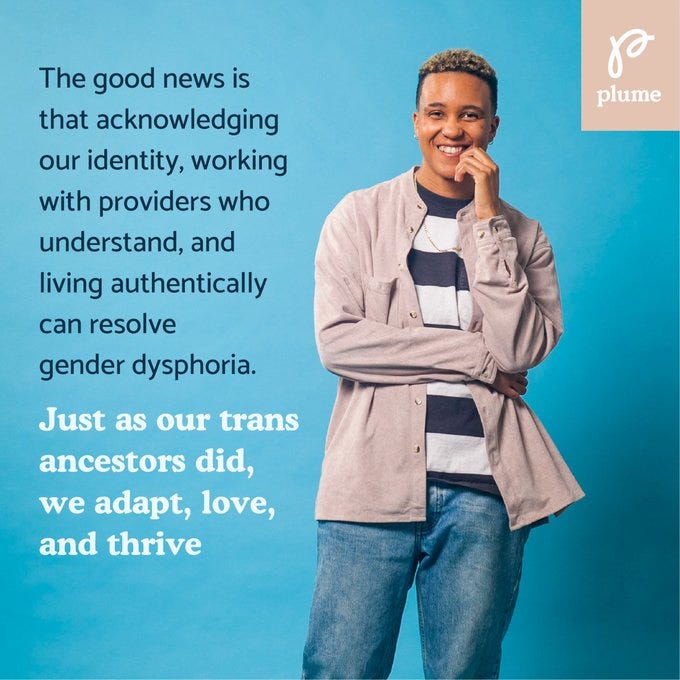I’ve been thinking lately about what drove me away from serious study of literature as a student: my professors dragged literature into the present and tortured it with interrogations, putting 21st-century words and concepts in the mouths of long-dead authors, as though they had nothing of their own to say to us.
I've always read to enter other worlds and slip sideways out of my own, not to subjugate and tyrannize these other worlds by the dictates of the present. Even if it's impossible to ever understand the past on its own terms, it's surely possible to move closer to understanding. The denial of that possibility filled me with despair. Those narrow readings of the past through the preoccupations of the present gave me a suffocating feeling: no hope, no air, no way out.
And now I get that same feeling when I see women like Joan of Arc dug up and transed, when I read ads for hormone regimens that celebrate generations of “trans ancestors.” What are we saying when we talk about trans ancestors? In what sense can such people be said to have existed?
As Lisa Selin Davis points out, there have always been men and women who didn't fit into their societies' ideas of how men and women should be. But to call these men and women "trans" is to yank them out of their own times and drown them in ours.
For most of human history, the concept of gender identity — much less transgender identity — didn't exist. 'Transition' did not exist until the medical technologies existed. These medical concepts and medical technologies have created, in the last century, a new way of being human: being trans.
There have always been women who responded to the constraints on their sex by living as men. Women who wanted to marry other women. Women who wanted to practice medicine. Women who, for whatever reason, didn't fit the mold of their times. (When I was a kid, we still looked up to these women as heroines, rather than insisting their nonconformity was just a sign they’d really been men all along…)
And that, right there, contains the forbidden acknowledgement: that social context shapes personal decisions, including the decision — in our own times — to transition. An uncomfortable topic in the age of innate gender identity, in whose holy name we righteously sterilize teenagers.
When we tamper with the past, subjugate it, sanitize it, apply software updates to it, we’re removing possibilities in the here and now: the possibility of stepping outside of our own time and its prejudices and fixations for a moment to see our problems differently.
When we interact only with a heavily revised and ideologically compliant past, we risk forgetting that we have our own blindspots and that it's unlikely we've arrived at a state of such perfect enlightenment that we will never look back on what we do now with different eyes. It lets us talk about being on the right side of history while we enact a very old story on the bodies of girls and women and gender-nonconforming youth.





It's not unlike what Mormons do, which is to baptize long dead ancestors as members of the church regardless of that dead person's faith. It's ridiculous and offensive to other faiths and family members.
As always, thoughtful and well expressed. When it comes to literature, there seems to have been many schisms between modes of perception - not all of them historical. My father studied under Leavis at Cambridge but my brother was taught about structuralism when his turn came in the 70's. I deliberately avoided the subject; choosing what I thought of as 'practical' studies, acting and then digital design; and I'm kinda glad I did. I've always intended to be a writer from my childhood onwards and I still try to approach other writer's work with the same openness I had then.
As for the reinventions of a 'trans history', everything I read is coloured by the knowledge that these distortions are the result of a carefully engineered campaign set in motion by wealthy individuals and companies many years ago that is finally bearing fruit. Sue Donym's substack, another straight talker, is very informative on this: https://suedonym.substack.com/p/inauthentic-selves-the-modern-lgbtq